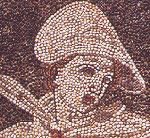Get to Your Story Through Character
Elizabeth George says that story is character. I think she's on to something, although I might put it slightly differently. I might say: a writer gets to his story through character.
Yes, I know, the official party line at Literature Headquarters is that theme is the ultimate standard of selection for a story. I think that's true. But a standard of selection is one thing; how a writer actually goes about developing a story in his own mind is quite another.
If you begin with a theme, for example, the next best thing to do, I believe, is to think of a character who would embody that theme, build that character up in your mind, and finally let that character lead you to the right plot and setting. If by chance you begin with a plot idea, which probably already includes some kind of heroic character, stop right there with the initial plot idea and develop that character further in order to find the right theme and to flush out your plot more thoroughly and accurately. What's happening here is simply that your character is acting as a vessel for your theme.
Witness that most stories are ultimately about people: what they care about, what aspect of their nature makes them care, what actions they take, and so on. Interesting stories are never about guns, bombs, and volcanoes, except insofar as those guns, bombs, and volcanoes impact a human being. Does a man use a gun for good or evil? Will he drop the bomb even if he knows it will kill someone he loves? Do villagers react to a volcanic eruption with courage or fear? What will they do, and why will they do it?
Likewise, interesting stories are never about an abstract theme like politics, except insofar as those politics impact a human being (or group of beings).
I don't mean to sound like an emotionalist here, but a writer has needs. His mind has a certain nature which can't be ignored. And it just so happens that holding an abstract, disembodied idea clearly in one's mind can be difficult to do.
That seems to be why my mind holds a thematic idea most clearly and most usefully when it's lodged firmly in the form of a character, not an abstract statement, not a setting, and not even a plot element. Sometimes when I can't move forward with those other elements of a story, it's because I don't know my main character. As Elizabeth George explains, how can you possibly know what your character is going to do — the plot — unless you know who your character is: what motivates him, worries him, what strengths he possesses, what weaknesses, etc.
In this sense, I suspect a writer is very much like his readers.
Labels: art of writing


<< Home